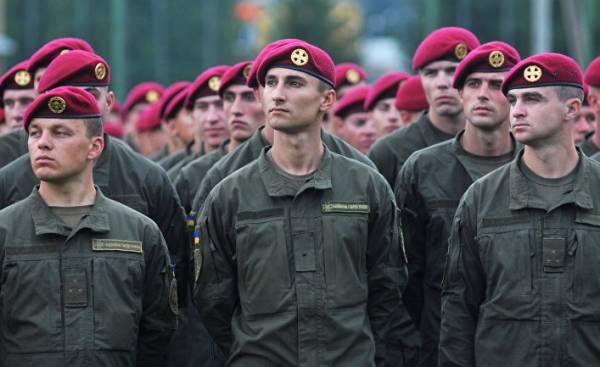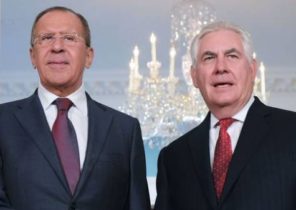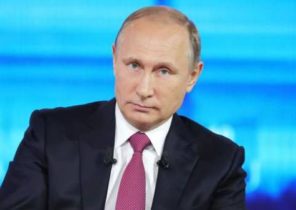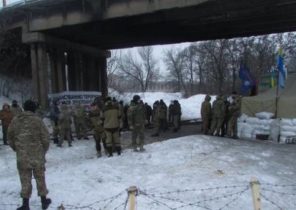
The issue of realism of Ukraine’s accession to NATO had acquired manipulative color. Some use the desire of the Ukraine to join the Alliance as proof that the country to the Western world. Others argue that no one in NATO is waiting for Ukraine. Since Ukraine for a number of reasons really far from NATO membership, and Russia struggled opposes NATO expansion, it makes you think whether the state has other means of ensuring national security, but to strengthen its own armed forces. That is to analyze whether the creation of the alternative NATO of the Association.
The expansion of NATO to the East
Russia has built its policy of confrontation between the North Atlantic Alliance on the myth of NATO enlargement to the East. Or rather, his distorted interpretation. The Russian side claims that it ensured that NATO will expand eastward. This promise to representatives of the Union allegedly gave during the negotiations about the reunification of Germany in 1990. President of the Soviet Union Mikhail Gorbachev participated in the negotiations with the American Secretary of state James Baker and German Chancellor Helmut Kohl. The first really provided a guarantee of non-expansion to the East as one of the solutions to the question of the participation of the United Germany in NATO. NATO was to remain within the boundaries of 1989. That is, the troops of the Alliance should not be not only on the territory of the former East Germany, but East of a United Germany.
The same position the Minister of foreign Affairs of Germany Hans-Dietrich Genscher presented his Soviet counterpart Eduard Shevardnadze. This version of the national security Council, the US seemed impossible, and in their letter they suggested a special military status for East German territories. But later Since, having on hand a letter from Baker and another from President George Bush, Gorbachev introduced just a milder proposals of the Secretary of state. The Soviet President took them, agreeing to the unification of Germany.
Later Baker and Kohl took the point of view of the national security Council and the President of the United States — with some restrictions to NATO only in the GDR. With the complication of the internal situation of the Soviet Union has become increasingly difficult to defend their interests. At the signing of agreements between Germany and the Soviet Union the issue of NATO enlargement did not formally secured. Professor of history at the University of southern California and a visiting Professor at Harvard, Mary Elise Sarat believes that the Soviet Union chose to believe the Western colleagues word for it. But after the change of President — place Bush took bill Clinton is an informal agreement was forgotten. In 1999 NATO entered Hungary, Poland and the Czech Republic. Five years to the North Atlantic, the company joined the Baltic and other countries. Naturally, the expansion of the Alliance to irritate Moscow. And now annoying.
As previously stated, the former U.S. Ambassador to Russia Michael McFaul, Russian diplomats are being manipulated, when talking about the above guarantees. In his words, he “didn’t see that it was somewhere written.” That Gorbachev believed in the word — only one of the interpretations, because after a couple of weeks after the talks in February 1990, at a press conference, Bush and Kohl had declared about the participation of a United Germany in NATO. Gorbachev talks on the reunification of Germany to disrupt did not dare, and later the issue of non-expansion of NATO is not raised.
To reduce the stress and ensure safety
The motives of independent States to join NATO is understandable, as the agreement of the Alliance on this — open-door policy, which, as insisted in the organization, a threat to Russia. Good chance to soon become a member of NATO is Montenegro, and, although formally we are not talking about further expansion to the East (after the accession of Romania, Bulgaria and others), in Moscow again not happy.
In response to the exercises, provocation and the deployment of Russian weapons on its territory, in particular in the Kaliningrad region, NATO forces, strengthen the security system in Lithuania, Latvia, Estonia and Poland. For that Russia again allegedly forced to react accordingly. This creates obvious tension and risks of unintended or planned conflict. Therefore, there are ideas on how to reduce the degree of NATO — Russia.
One of the options, as written in the material for Project Syndicate, the German specialists in the sphere of security Volker Perthes and Oliver Mayer, could be arms control in the Baltic region. “To prevent the threat of an arms race or military confrontation, both sides need to agree on mutual measures for the limitation of military capabilities and engage in arms control”, — convinced the leaders of the German Institute for international politics and security.
The Baltic sea region could become a test of the efficiency of a security policy. The authors have no illusions about the desire of the Kremlin to play by the rules and to improve relations with the West. However, further aggravation of relations between Western countries and Russia can have dire consequences. Therefore, they believe, should at least try, despite significant disagreements on this issue within NATO. Especially during the cold war, the same methods have reduced the risk of war.
Parties, and Meyer insist that the Alliance should strike a balance between convincing security guarantees for its members in the Baltic States and Central Europe (that is, it should not affect the plans to deploy four battalions in Poland, Lithuania, Latvia and Estonia), while continuing dialogue and cooperation with Russia. And “such efforts will enhance mutual trust, without undermining the policy of deterrence.” “Russian reluctance to get involved in the dialogue to indicate a willingness to resort to military surprises in the future, and thus even the failure of such a dialogue will benefit NATO and the Baltic countries. It’s certainly better than doing nothing,” — said the publication.
Let’s face it, that now NATO members don’t have full confidence that the Alliance will decide on activation of article 5 of the NATO Charter in case of Russian covert operations in their territory. Western experts well know, when you write that the Alliance in this case, rather resort to hard non-military response, in order to avoid a big war.
Additional emotion creates and still vague strategy of the administration of Donald trump against NATO. Hence the desire of Poland and the Baltic States to develop regional cooperation in the relations with Sweden and Finland, cooperating with NATO, but so far have avoided membership. Understanding the strategic interests of the same course was selected in respect of Ukraine. Kiev, for its part, to strengthen such linkages should be interested even more. But how far will such cooperation?
Baltic-black sea illusion and other “alternatives”
In a situation of extreme tension NATO membership of Ukraine and Georgia as extremely important for Russia States is not even considered in the short term. And occupied the Ukrainian and Georgian territory, make the path to NATO is more tortuous.
Senior fellow at the Brookings institution Michael O’hanlon is a supporter of the idea that Ukraine and Georgia will help neutral. Putin allegedly has reason to weaken these and other Eastern European neutral countries, because they once promised membership in the Alliance. And yield, O’hanlon insists, should be “permanent neutrality” such States as Ukraine, Moldova, Belarus, Georgia, Armenia, Azerbaijan, Cyprus, Serbia and other Balkan countries. In this case, Russia and NATO would provide them security guarantees, and they would retain the right to cooperate with NATO. After the withdrawal of anti-Russian sanctions would be lifted. However, the expert said, there is no guarantee that Putin this idea interested.
With the proposal disagree O Hanlon former U.S. Ambassador to Ukraine Steven Pifer, an employee of the same Brookings institution. First, at least Ukraine and Georgia will oppose the creation of such a neutral zone. Second, “while Russia could say that she would respect the neutrality of these countries, we can expect the usual intervention in their internal and external Affairs”. Finally, Russia does not recognize the right of neutral countries to join the EU. Pifer recalled that at the beginning of the Russian intervention, no one was going to put Ukraine on the path of NATO membership.
Of course, the most logical minimum programme for Ukraine now is the expansion of the defense (and not only) cooperation with its traditional allies — Poland and the Baltic States. Romania, Turkey and others. It is one of those countries famous idea of the so-called Baltic-black sea Union, “Memoria” Symon Petliura and Jozef Pilsudski.
However, is there any reason to believe that conditional Bulgaria, refused in the past year from the project of a permanent NATO fleet in the Black sea, provide a single flotilla of the Turks and the Romanians will be the supporter of another Union with similar goals in the region? After all, promoted the initiative in the first place, not even NATO, and Ukraine, Romania and Turkey. Despite a common interest in the protection of Russian threat between the individual countries of the Alliance are still enough differences. As between Bulgaria and Turkey or, to a lesser extent, Poland and Lithuania.
The lack of Ukraine’s short-term prospects for membership in NATO does not mean that it cannot and should not be our ultimate goal, I’m sure the head of the Program of research of problems of international security of the center “Ukrainian prism” Anna Shelest. Indeed, the prospect of membership is not only a conditional guarantee of collective security, but also the need for clearly defined reform and modernization of the security sector.
“Available formats institutiolization analog — to another international organization — not now. The CSTO is not an alternative or political reasons or by their own potential. Baltic-black sea Union. First, it is not even clear the concept that there are many options for development. Second, in all presented so far the initiatives of the military-political cooperation was not among the priorities,” commented for “Apostrophe” the Rustle.
On the other hand, additional bilateral and multilateral agreements with its neighbours and strategic partners can contribute to cooperation or to ensure regional and national security. Appropriate initiatives can be developed without abandoning the overall strategic policy of NATO membership.
“In the short term Ukraine is expedient to use the Swedish model of security policy, which is in close Euro-Atlantic cooperation and the achievement of the military standards NATO without formal membership in the Alliance. In addition, Kiev must initiate new European security architecture, which would have minimized the risk of Russian aggression against our country”, — agrees analyst International centre for policy studies Yevgeny Yaroshenko.
Practical the same opinion “Apostrophe” stated Chairman of the Board of the Foundation “Initiative for the study of East European security,” Maxim Khilko: “Ukraine is more expedient to speak not about finding an alternative to NATO, and about the parallel development of regional military cooperation. To develop such things as, for example, Litpolukrbrig, focusing on system collaboration, joint projects of the military-industrial complex, regular joint trainings, joint arrangements alert about the threats and constant consultations”.
This model can be build not only in relations with Poland and the Baltic States, but also, for example, with Finland, Romania, Bulgaria, Turkey.
“We should not build illusions that such regional cooperation can fully replace NATO membership, because, first, even the combined military power of the countries of Eastern Europe are not comparable with the military machine of Russia; secondly, it is difficult to expect that someone from the partners will be ready to intervene in a military conflict with the participation of even a friendly country, but with no obligations that is similar to the fifth article of the Washington Treaty. […] One of our more successful in terms of Euro-Atlantic integration of the partners would not change the existing safeguards NATO illusory (at least not yet) projects,” says Hilko.
“Prospects of integration of the Baltic-black sea Union, unfortunately, not too bright. We are not ready neither the political elite in the respective States, nor the population. This becomes obvious if you look at the survey data — who is considered the main foreign policy partners the same poles,” added the specialist in the field of security. An obstacle to this plan could be that the same Poland economically incomparably more associated with Germany than with Ukraine. So while Ukraine should focus on the parallel preparations for membership and deepening regional cooperation. Almost every one of these countries or is already a member of NATO, and became a close partner of the Alliance with virtually complete compatibility.






